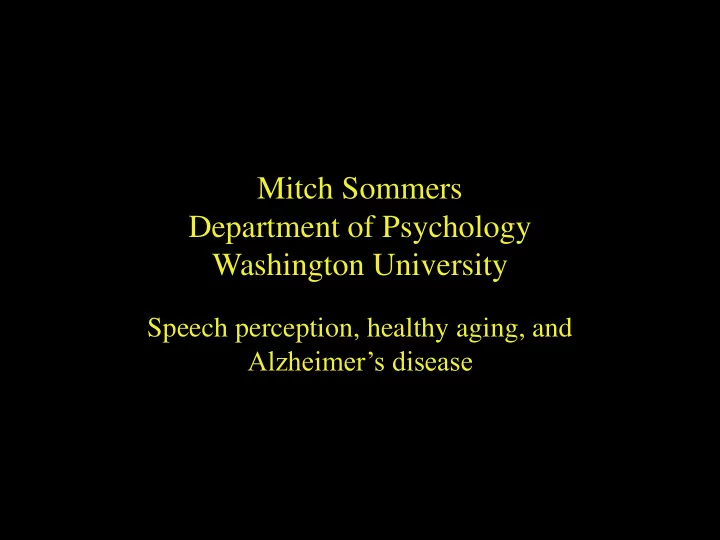

Mitch Sommers Department of Psychology Washington University Speech perception, healthy aging, and Alzheimer’s disease
Basic research questions • What are the sensory and cognitive declines that result in age- related impairments in speech perception? – Compare young and older (often an inherent confound) – Compare healthy older with Alzheimer’s patients • What cognitive factors are important for understanding speech (especially in noise)? – Role of cognitive control • False hearing in older adults (inability to resist contextual influences) • Talker information available from the speech signal – Credibility assessment – Height – Age • Can training (auditory, cognitive) improve speech perception?
Impact on Speech technology • Auditory-visual speech perception – Has large effect on human speech percepton • As good or better than a well fit hearing aid – Incorporate visual speech (seeing the talker) in automatic speech recognition? • Talker characteristics from speech – Use in automatic speaker identification?
• Auditory training – Development of game-based training – Development of automatic on-line recording and editing • Records voice of any individual and these stimuli can then be instantly incorporated into any of the training games • Train with words by frequent communication partners – Summer camp with HI kids listening to next year’s teacher • Same games can be used to improve perception and production by non-native speakers
Funding considerations • Research areas – Interdisciplinary (including international) research • Similar to Interdisciplinary behavioral and social science research program • Integration of ASR and speech researchers • Conference grants – Training studies • Almost no research on what makes training effective – Nature of the input – Amount – How long do improvements last – Predictors of benefit/expected benefit – Computational modeling of speech perception • Compare to visual word recognition
Funding considerations (cont’d) • Integration of imaging and behavioral methodologies – Focus on resolving discrepancies – Establish standard methodologies • The case of perceptual effort • Integrating studies of speech perception and production – Similar issues but rarely studied together. • Exciting opportunity for interactions between researchers approaching speech perception and speech technology from different perspectives.
Recommend
More recommend